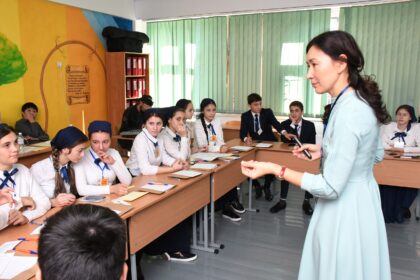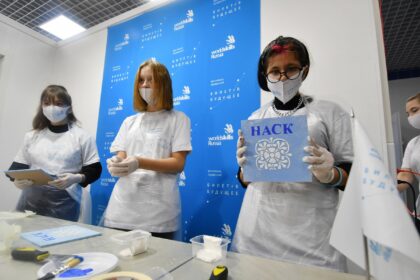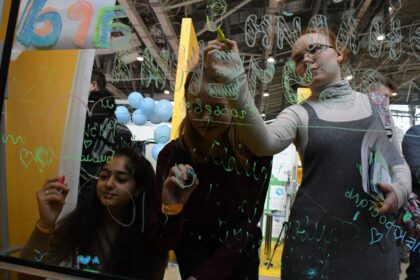В 1982 г. в СССР приезжал Артур Кларк. Предварительно он прислал в Союз писателей список тех, с кем желает встретиться. Меня срочно вызвали из Новосибирска, ведь я была первым человеком в стране, защитившим диссертацию по зарубежной фантастике. В этом, кстати, Кларк мне очень помог – присылал книги, журналы, письма. На встрече было много журналистов с диктофонами и я с блокнотом. Писатель рассказывал про вербальный процессор – удивительное для того времени изобретение. После встречи я улетела домой, а потом началось что-то странное, необъяснимое. Буквально через день мне позвонили из «Литературной газеты» и сказали, что у всех, кто присутствовал в зале, записи оказались стертыми. Прямо как в романе «Волны гасят ветер» братьев Стругацких. Тогда вспомнили обо мне, поскольку видели, что я что-то записывала от руки, и попросили о помощи. За ночь настрочила на машинке 18 страниц, которые утром фельдъегерь увез в Москву. Самое интересное, что за тот материал я получила премию как за лучшую статью года. И вот сейчас я решила переработать ее в виде материала для урока английского языка. Надеюсь, он пригодится читателям «ИКТ в образовании»!
FAMOUS PEOPLE
Pre-Reading Activities
A: Discussion. How would you define a famous person?
Separate into two groups.
Group A: Make a list of professions or occupations which you think make people famous.
Answer the following questions:
1. Which is number one in your list?
2. Which is the last one?
3. Why do you think people are curious about the rich and/or famous?
4. What makes you curious about a celebrity?
Group B: Make a list of events which you think make people famous.
1. Which event is number one in your list?
3. What makes a story about any such event interesting?
4. What makes you remember an event?
B: Vocabulary.
Today’s article has some new words. Match the words with their meanings.
Words
1. Grad student
2. thesis
3. beaming
4. scribble
5. frantic
6. blank
7. leap
Meanings
1. An empty space
2. Write meaningless marks
3. Sudden jump
4. Studying at a university for a degree
5. Shining bright
6. An uncontrolled state (of mind etc.)
7. A long piece of writing on a particular subject
Reading Activities.
A. Scanning.
You are going to read an essay about Arthur Charles Clarke, a famous British writer.
1. Scan the essay to see which topics are discussed.
a) Mr. Clarke’s biography.
b) Ms. Koptyug’s biography.
c) Mr. Clarke’s visit to Moscow.
d) Mr. Clarke’s books.
2. What other topics are discussed?
B. True (t), False (f), Not Mentioned (nm)?
Read these statements and write «t» if the statement is true according to the text, «f» if the statement is false, and «nm» if the essay does not have that information.
1. Mr. Clarke was a grad student when he met Ms. Koptyug.
2. They met in Moscow.
3. They met this year.
4. He began writing science fiction as a student.
5. There was only one woman present at the meeting in the Writers Union.
6. A lot has been written about Mr. Clarke lately.
C. Reading Intensively.
Read the essay carefully and answer as many questions as you can.
1. Why did Ms. Koptyug write to Mr. Clarke?
2. Did he answer her letters?
3. How did he help her in his studies?
4. How did they meet?
5. What’s happened after the meeting?
6. Where was Ms. Koptyug’s article published?
Arthur C. Clarke
When I was a grad student, I wrote to several writers informing them about my work, and also asking their permission to quote, translate and in general use their books in my thesis. A.C.C. wrote back asking for some particulars and a picture. Then he sent me all his books, various magazines, newspapers, and continued to help me and to answer all my questions during those three years. Some fifteen years ago, he decided to visit Russia, and he sent in a list of people he wanted to meet, including myself. So the Writers Union paid for my trip to Moscow. There were about fifty people present at the first meeting. A.C.C. came in, looked around, marched straight to me with a beaming face, we hugged and kissed. At that time I was not as widely known in some narrow circles as I am now. One of the journalists stared, perplexed, and then asked, «How did you know who she was?» A.C.C. said, «I asked that Nina be included, and as there’s just one woman present, I thought it must be she».
So, the journalists were sitting around with their cassette-recorders, and I was quietly scribbling in my notebook (I don’t trust machinery). We spent next day together with A.C.C., then I went home. In a day or two, I got a frantic phone call from Moscow. ALL the recordings turned out to be blanks. Nobody had any material about that first large meeting. The Literary Gazette reporter remembered me. They asked me to write whatever I could, as much as I wanted, I spent a hot July night furiously typing, they sent a special courier to pick it up and published the whole large page next week.
The Literary Gazette was as high as one could go in my specialty. Lots of us never get there. That was a nice leap to the top. The readers loved the story and voted it Best of the Year. I got my award. Add to it the fact that A.C.C never forgot to mention «that charming young woman, Nina…» in his interviews… Even today, the press people, SF writers and fans may suddenly react to my name with, «Why, aren’t you that charming young woman who?..»
D. Translation (for those who teach translation in their ESL/EFL class).
Choose ONE paragraph which you wish to read and translate. Write out all the words you did not know before. Discuss them with your partner(s). Which words would you learn by heart for future use? Why?
E. Language. Grammar (Group Work).
Scan the essay again. Which two tenses are most often used as narrative tenses? Why? Give your own examples of both tenses. Explain the difference in their usage.
Post-Reading Activities.
You may do one or more of the following activities.
1. Vocabulary.
In two groups, compile a list of words and expressions that you would use when speaking about Famous People.
2. Role Play.
In pairs, conduct an interview with a celebrity, with one of you acting as a reporter, and another as a celebrity of choice. Then swap roles.
3. Discussion.
In two groups, decide whether YOU want to be famous or not.
Group A should offer arguments for, and Group B arguments against being a celebrity.
4. Web Work (if possible).
Students can try and find some information about a famous person of their choice with the help of a search engine on the Web, and make a short presentation at their next lesson.
Teacher’s Notes and Answer Key.
A. Discussion.
If students find it a bit difficult to begin, you may write any names for professions and occupations on the board, like JANITOR, SUPERMAN, WRITER, CLERK.
Allow them a little time to formulate their answers. Have them each use full sentences, nit just «yes» – «no» during the discussion.
B. Vocabulary.
1 – 4, 2 – 7, 3 – 5, 4 – 2, 5 – 6, 6 – 1, 7 – 3.
1. c) is discussed.
2. The strange failure of the machinery.
Ms. Koptyug’s publication and award.
B. True (t), False (f), Not Mentioned (nm).
1 – f, 2 – t, 3 – f, 4 – nm, 5 – t, 6 – nm.
C. Reading intensively. Answers:
1. She was writing a thesis about him.
2. Yes.
3. He sent her books.
4. They met in Moscow.
5. All the recordings were blank.
6. In The Literary Gazette in Moscow.
D. Translation.
Allow each student to choose a paragraph. Be on hand to help if needed.
E. Language. Grammar.
The two narrative tenses used in the essay are the past simple tense and the past continuous tense.
Нина КОПТЮГ, Новосибирск
Post-







 Выбор читателей
Выбор читателей







Комментарии